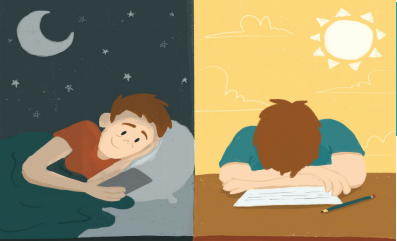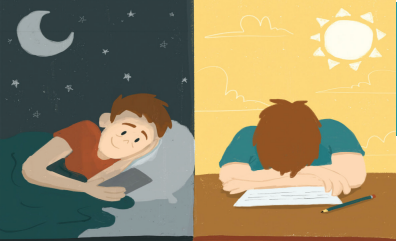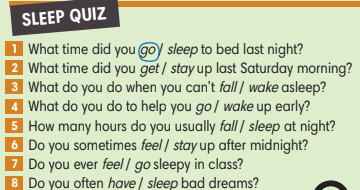Tiếng Anh 7 Unit 4 4.31. Do you agree with statements a-c? 2. Read the text. What’s Polly’s advice 3. Read the text again. Choose the correct answer. 4. How do you say these phrases in your language? 5. In pairs, read the Sleep Quiz and choose the correct opinion. Then interview each other. Quảng cáo
Lựa chọn câu để xem lời giải nhanh hơn
Bài 1 1. Do you agree with statements a-c? (Bạn có đồng ý với câu a-c không?) a. It’s hard to get up in the morning. (Thật khó để thức dậy vào buổi sáng.) b. I sleep more than my parents. (Tôi ngủ nhiều hơn bố mẹ tôi.) c. I never want to go to bed before 11.00 p.m. (Tôi không bao giờ muốn đi ngủ trước 11 giờ tối.) Lời giải chi tiết: I agree with statement c. I never want to go to bed before 11.00 p.m. (Tôi đồng ý với câu c. Tôi không bao giờ muốn đi ngủ trước 11 giờ tối.) Bài 2 2. Read the text. What’s Polly’s advice (Đọc văn bản. Lời khuyên của Polly là gì) a. for weekdays? (cho các ngày trong tuần?) b. for the weekend? (cho cuối tuần?) Dear Polly, Last night, I went to bed at ten o’clock. Two hours later, my eyes were still open, so I got up. My parents were on the sofa. They always fall asleep in front of the TV. They don’t go to bed when they are sleepy, so why do I have to go to bed when I’m not sleepy? Last Saturday, my mum work me up at 8.00 a.m. She said I was lazy, but that was not fair. I always feel tired in the morning because I have to get up early during the weekdays. Karl
Hi Karl, Your parents care for you as sleep is important for our health. Teenagers need more sleep than adults. Seeing bright lights in the evening will not make you feel sleepy. You shouldn’t surf the Internet before bedtime during the weekdays. It’s better to read or listen to music. However, you should tell your parents that you need yo stay in bed late at weekends. Polly Tạm dịch: Polly thân mến, Tối qua, tôi đi ngủ lúc 10 giờ. Hai giờ sau, mắt tôi vẫn mở nên tôi đã đứng dậy. Cha mẹ tôi đã ở trên ghế sofa. Họ luôn ngủ gật trước TV. Họ không đi ngủ khi họ buồn ngủ, vậy tại sao tôi phải đi ngủ khi tôi không buồn ngủ? Thứ Bảy tuần trước, mẹ tôi làm việc cho tôi lúc 8 giờ sáng. Mẹ nói tôi lười biếng, nhưng điều đó không công bằng. Tôi luôn cảm thấy mệt mỏi vào buổi sáng vì phải dậy sớm trong các ngày trong tuần. Karl
Chào Karl, Cha mẹ của bạn quan tâm đến bạn vì giấc ngủ quan trọng đối với sức khỏe của chúng ta. Thanh thiếu niên cần ngủ nhiều hơn người lớn. Nhìn thấy đèn sáng vào buổi tối sẽ không làm cho bạn cảm thấy buồn ngủ. Bạn không nên lướt Internet trước giờ đi ngủ trong các ngày trong tuần. Tốt hơn là đọc hoặc nghe nhạc. Tuy nhiên, bạn nên nói với cha mẹ rằng bạn cần phải đi ngủ muộn vào cuối tuần. Polly Lời giải chi tiết: a. Polly says he should try to go to bed earlier, he should avoid the Internet and TV before going to bed. (Polly nói rằng anh ấy nên cố gắng đi ngủ sớm hơn, anh ấy nên tránh Internet và TV trước khi đi ngủ.) b. Polly says he should tell his parents that he needs to sleep longer at the weekend. (Polly nói rằng anh ấy nên nói với bố mẹ rằng anh ấy cần ngủ lâu hơn vào cuối tuần.) Bài 3 3. Read the text again. Choose the correct answer. (Đọc văn bản một lần nữa. Chọn câu trả lời đúng.) 1. Karl says they last night he feel asleep. (Karl nói rằng đêm qua anh ấy cảm thấy buồn ngủ.) a. very quickly. (rất nhanh.) b. after his parents. (sau khi cha mẹ của anh ấy.) c. before his parents. (trước cha mẹ mình.) 2. Karl’s mother woke him up last Sunday because (Mẹ của Karl đã đánh thức anh ấy vào Chủ nhật tuần trước vì) a. she needed his help. (cô ấy cần sự giúp đỡ của anh ấy.) b. he wanted to get up early. (anh ấy muốn dậy sớm.) c. she thinks it’s wrong to stay in bed late. (cô ấy nghĩ là sai khi đi ngủ muộn.) 3. Karl is writing to Polly because (Karl viết thư cho Polly vì) a. he wants to get up early. (anh ấy muốn dậy sớm.) b. he disagrees with his parents. (anh ta không đồng ý với cha mẹ mình.) c. he can’t sleep. (anh ấy không thể ngủ.) 4. Karl always feels tired as (Karl luôn cảm thấy mệt mỏi vì) a. he has to get up early. (anh ấy phải dậy sớm.) b. he has to study hard all day. (anh ấy phải học chăm chỉ cả ngày.) c. he has to study late at night. (anh ấy phải học khuya.) 5. Polly says (Polly nói) a. sleep is more important for young people than old people. (giấc ngủ quan trọng đối với người trẻ hơn người già.) b. adults need a lot of sleep. (người lớn cần ngủ nhiều.) c. teenagers need more sleep than older people. (thanh thiếu niên cần ngủ nhiều hơn người lớn tuổi) 6. Polly suggests that (Polly gợi ý rằng) a. Karl should get up early every day. (Karl nên dậy sớm mỗi ngày.) b. Karl shouldn’t surf the Internet before going to bed. (Karl không nên lướt Internet trước khi đi ngủ.) c. Karl shouldn’t listen to music or read before bedtime. (Karl không nên nghe nhạc hoặc đọc sách trước giờ đi ngủ.) Lời giải chi tiết:
1. Karl says they last night he feel asleep. => b. after his parents. (Karl nói rằng đêm qua anh ấy cảm thấy buồn ngủ. => b. sau khi cha mẹ của mình.) Thông tin:Two hours later, my eyes were still open, so I got up. My parents were on the sofa. They always fall asleep in front of the TV. (Hai giờ sau, mắt tôi vẫn mở nên tôi đã đứng dậy. Cha mẹ tôi đã ở trên ghế sofa. Họ luôn ngủ gật trước TV.) 2. Karl’s mother woke him up last Sunday because => c. she thinks it’s wrong to stay in bed late. (Mẹ của Karl đã đánh thức anh ấy vào Chủ nhật tuần trước vì => c. cô ấy nghĩ là sai khi đi ngủ muộn.) Thông tin:She said I was lazy, but that was not fair. (Mẹ nói tôi lười biếng, nhưng điều đó không công bằng. ) 3. Karl is writing to Polly because => b. he disagrees with his parents. (Karl đang viết thư cho Polly vì => b. anh ta không đồng ý với cha mẹ mình.) Thông tin:They don’t go to bed when they are sleepy, so why do I have to go to bed when I’m not sleepy? (Họ không đi ngủ khi họ buồn ngủ, vậy tại sao tôi phải đi ngủ khi tôi không buồn ngủ?) 4. Karl always feels tired as => a. he has to get up early. (Karl luôn cảm thấy mệt mỏi vì => a. anh ấy phải dậy sớm.) Thông tin: I always feel tired in the morning because I have to get up early during the weekdays. (Tôi luôn cảm thấy mệt mỏi vào buổi sáng vì phải dậy sớm trong các ngày trong tuần.) 5. Polly says => c. teenagers need more sleep than older people. (Polly nói => c. thanh thiếu niên cần ngủ nhiều hơn người lớn tuổi.) Thông tin:Teenagers need more sleep than adults. (Thanh thiếu niên cần ngủ nhiều hơn người lớn.) 6. Polly suggests that => b. Karl shouldn’t surf the Internet before going to bed. (Polly gợi ý rằng => b. Karl không nên lướt Internet trước khi đi ngủ.) Thông tin:You shouldn’t surf the Internet before bedtime during the weekdays. (Bạn không nên lướt Internet trước giờ đi ngủ trong các ngày trong tuần.) Bài 4 4. How do you say these phrases in your language? (Làm thế nào để bạn nói những cụm từ này trong ngôn ngữ của bạn?)
Lời giải chi tiết:
1. feel tired / sleepy: cảm thấy mệt mỏi / buồn ngủ 2. fall asleep: ngủ gật 3. get ready for bed: sẵn sàng đi ngủ 4. go to bed / sleep: đi ngủ / ngủ 5. get / wake up early / late: dậy sớm / dậy muộn 6. sleep well / badly: ngủ ngon / ngủ không ngon 7. have a dream: có một giấc mơ 8. stay in bed / up late : ngủ trên giường / dậy muộn Bài 5 5. In pairs, read the Sleep Quiz and choose the correct opinion. Then interview each other. (Theo cặp, đọc “Câu đố về giấc ngủ” và chọn ý kiến đúng. Sau đó phỏng vấn lẫn nhau.)
Lời giải chi tiết:
1. What time did you go to bed last night? (Bạn đi ngủ lúc mấy giờ tối qua?) 2. What time did you get up last Saturday morning? (Bạn dậy lúc mấy giờ sáng thứ Bảy tuần trước?) 3. What do you do when you can’t fall asleep? (Bạn làm gì khi không thể ngủ?) 4. What do you do to help you wake up early? (Bạn làm gì để giúp bạn dậy sớm?) 5. How many hours do you usually sleep at night? (Bạn thường ngủ bao nhiêu tiếng vào ban đêm?) 6. Do you sometimes stay up after midnight? (Đôi khi bạn có thức khuya sau nửa đêm không?) 7. Do you ever feel sleepy in class? (Bạn có bao giờ cảm thấy buồn ngủ trong lớp không?) 8. Do you often have bad dreams? (Bạn có hay gặp những giấc mơ xấu không?)
|
























Danh sách bình luận